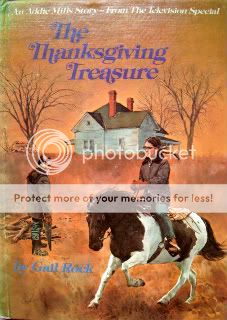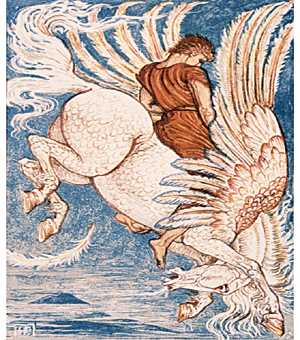Thanksgiving, finest of holidays. A four-day weekend, loads of food, no gifting pressure, no massive buildup of holiday cheer, just a parade (switching between the slickness of New York and the hokiness of Philadelphia), a dog show (the Irish Setter won this year!), and food. Turkey and stuffing and mashed potatoes and olives and buns and more stuffing and gravy and pumpkin pie and whipped cream (the deliciously fake kind that comes in a little plastic tub), and I think I forgot to get some of the apple pie. Excuse me.
Back with pie. Despite the fact that this is a pretty big American holiday, it's never really been popular as a setting for fiction. That makes me all the more tickled to coordinate an appropriate book for today. To be honest, this is not all that horsey, but it does have a horsey theme. And it is a compelling book. Given its unusual pedigree, that's impressive all by itself. It was originally created as a novelization of a CBS made-for-TV-movie, along with three other books about Addie Mills, an adolescent girl in 1940's Nebraska. Everything about these books tells you they're from an earlier era, one where people didn't own a ton of stuff, didn't decorate to impress, didn't have junk food and toys bulging from every cabinet. The author vividly recreates a time when youngish adults were still deeply affected by the Depression years and the world wars, grumpy old codgers abounded, and everything was a lot more basic.
 The Thanksgiving Treasure
The Thanksgiving TreasureGail Rock, il. Charles C. Gehm
1974, Alfred A. Knopf, Inc.
I would have happily given up any member of my family or any friend, including Carla Mae, to have a horse, but the mere mention of the word was enough to guarantee an argument from my father. He had grown up on a farm, and he saw nothing thrilling about a horse. He simply did not respond to my fantasies of riding at a gallop across the plains beside Roy Rogers and Dale Evans.
In November of 1947, Adelaide "Addie" Mills is growing up in Clear River, Nebraska, population 1,500, with her widower dad and her grandmother. Her dad's a curmudgeon, and has a long-standing feud with another local crank, farmer Walter Rehnquist
. Rehnquist is a semi- hermit who threatens people with his shotgun if they trespass on his farm at the edge of town. Addie's always been content to accept her dad's view on the matter of the feud, but a combination of the season of overtures and the discovery that Rehnquist owns a horse gives her an idea; the Pilgrims and the Indians became friends over a shared meal on the original Thanksgiving, so why not invite the family enemy to the holiday dinner? Her dad's reaction is predictable.
"Well, think again before you come up with another damn fool idea like that!"She tries to shop the idea to her best friend, Carla Mae, whose large family, she argues, won't even notice an additional face at the table. When that fails, she pulls out all the stops and argues that if no one wants the old grouch at their table, they should take a Thanksgiving meal
to him. Carla Mae is not enthusiastic -
"You're crazy!" she said. "The only reason you want to go is to see that stupid horse!"- but gives in. Addie sneaks food off the table and then the two ride their bikes off into the darkness of a Thanksgiving afternoon. Rehnquist grudgingly lets them in and samples the food, but cuts to the heart of Addie's motivation -
"I'm a pretty smart old gink," he said, "So don't fool around with me, sister. Tell me the truth!" "I told you, it's the spirit of Thanksgiving, and ... I was worried about your horse."

It turns out the pinto mare is named Treasure, and Rehnquist is on the fence about letting Addie ride her until she mentions that her father won't let her ride.
A very short, quick book which moves along more by virtue of atmosphere and character than plot. It's not really a horse book - Treasure, while a pivotal part of the plot, is not actually in most of it.
This book - and the series it was a part of - has an odd story. The book was an early example of a book based on a visual medium, in this case a TV movie which originally aired on CBS on November 18, 1973. The movie was released on VHS as
The Holiday Treasure, packaged with the far better-known prequel
The House Without A Christmas Tree. Addie's adventures are based on those of the author/screenwriter, Gail Rock, and continue for two more movies/books, both of them also holiday themed.
A Dream For Addie (the book) aka
The Easter Promise shows Addie idolizing a famous actress who returns to her hometown of Clear River, and in
Addie And The King Of Hearts, Addie develops a crush on a teacher.
Links
IMDB for The Thanksgiving Treasure (1973)
Flying Dreams - a fan page for the film trilogyCollecting Children's Books blog - the booksRoy Rogers websiteValley, NebraskaOther Editions
1) A Bantam Book/Scholastic edition from 1976 (with, unfortunately, some writing on the cover)

2)
A Dell Yearling edition (1986)3) It also appeared in
Redbook Magazine as a serial in November of 1974.
And the TV movieThe actress who plays Addie actually broke her leg falling from the horse during filming.
 About the Author
About the AuthorRoberta Gail Rock (1940-____)
Rock grew up in Valley, Nebraska, which seems like a basic name even for the Midwest, and moved to New York to work in journalism. She worked as a film/TV critic for
Women's Wear Daily, and did freelance writing.










